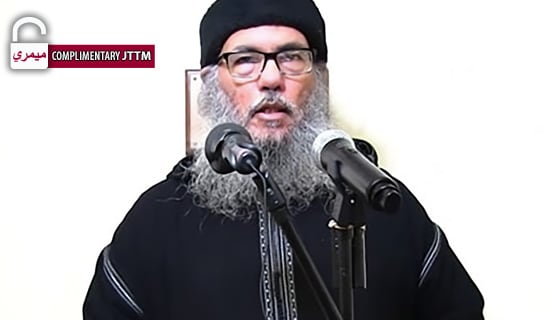

Boris Vishnevsky (Source: Forpost-sz.ru)
Boris Vishnevsky, a columnist for Novaya Gazeta and a St. Petersburg Legislative Assembly deputy for the liberal Yabloko party wrote a column explaining why authoritarianism in Russia has failed the test of the coronavirus crisis, despite its pretensions to be ideally equipped to handle such crises. Vishnevsky explains that the system is severely handicapped by its rapacity, its promotion of personnel. whose major talent is loyalty to the leader, and its isolation from the corrective mechanism of public feedback. As a result, Russian officialdom from Putin on down is concerned with its own agenda and not with the people's plight. It needs to exude the image that "everything is under control" and buttresses that image with false data transmitted upwards, as in Soviet times. Vishnevsky's article follows below:[1]"The citizens' irritation with the Russian authorities' actions is easily explained: The citizens, sitting at home without work and money, see only increasing new prohibitions, threats and punishments.
"What they do not see is the necessary assistance from the state, which would help them endure the restrictions imposed by the authorities.
"And although the obligatory one and a half month of 'weekends' is over, there were no direct payments to all citizens (which were demanded by the Yabloko party, by opposition regional and municipal deputies, by politicians Gudkov and Navalny and by economists [Vladislav] Inozemtsev and [Sergey] Guriev). The promised one-time payments of 10 thousand rubles to families with children for each child from 3 to 15 years old (the total amount of assistance is about 400 billion rubles) leave the Russian National Wealth Fund almost untouched.
Citizens are puzzled: whatever happened to the 'vertical of power' and the 'strong hand', which were nurtured for decades exactly for the purpose of effectively responding to any challenges.
However, [events] that are happening now fit into a coherent and logical picture, one only needs to choose the initial hypothesis correctly: the 'vertical of power' was not designed and built in order to solve the problems of citizens. It was created for a completely different task!
Actually, all this was perfectly and accurately described half a century ago in the novel "Inhabited Island" [Prisoners of Power] by the Strugatsky brothers [Arkady and Boris Strugatsky].
";They have two goals, one of which is the main [goal], the other is the fundamental [goal]. The main goal is to retain power. The fundamental goal is to derive maximum satisfaction from this power. There are also gentle people among them, they get satisfaction from the knowledge that they are the people's benefactors. But most of them are thieves, voluptuaries, sadists, and they all are power-hungry.'"
SUPPORT OUR WORK

"The goal of the "vertical of power" is not to provide services to the population (which is an intended goal of power in a democratic state). Its purpose is to preserve the power of a narrow group of individuals (regardless of public sentiments) and to convert these powers into property and assets for them, their relatives and friends. All according to the Strugatskys' vision.
"People are surprised: why governors are incapable (with rare exceptions) of making timely and correct decisions in the citizens' interests? Why does every decision they make provoke anger and resentment (starting from the "temple development" of public parks[2], the "renovation" projects[3] and "optimization" of hospitals to dispersal of peaceful protests, and raids on citizens who dared to walk in half-empty parks)?
"Because they are managing the public assets (…) not for the benefit of the citizens. They are working in order to distribute the resources (following orders), to provide the necessary election results, and to report to the top that 'everything is under control' e.g. there are no mass protests and citizens unanimously approve the party and government policies.
"The governors of the 1990s (despite all their shortcomings) were still politicians, who won real elections, with fierce competition.
"The governors of 2000s – officials have a background predominantly from the 'siloviki' [security agencies. They were] clerks, secretaries, adjutants and security guards (or in the optimal scenario second-tier officials). In other words, they came from professions whose work, in principle, does not imply independence, but instead implies receiving orders and sending reports of their fulfillment.
"These are the people who, in principle, are unaccustomed to evaluating society's reaction to their actions, but know how to evaluate the authorities' reaction. So when they become governors, they are fully aware that they have one voter - the president and only his opinion is important. They teach their subordinates the same thing: opinion of some citizens doesn’t matter, your boss' opinion – that is what’s important. Therefore, throughout the "vertical of power" the perennial task is to conceal the true state of affairs.
"So, if the governor is afraid to report the truth to the president, it also means that his subordinates are also afraid to tell it to him. A system of total misinformation arises, whose origins so back to Soviet times. Irina Rodnina[4] once gave an example from her work at the Komsomol[5] Central Committee: having received from the region clearly overstated numbers on people who passed the GTO[6] standards, she called and asked for additional information. An hour later they called her back and she received data with even higher numbers, which even exceeded the total number of Komsomol members in a region. Apparently, after the call, the regional authorities decided that the achievements in their account were insufficiently large.
"Today, in a crisis situation, Putin's governors as always wait for the orders 'from above' (since they operate in an entire system centered on one person) - but the orders don’t come. Because, as my old friend Sergey Shelin correctly noted, the main thing in the president’s reference frame was amendments to the Constitution, which should have entrenched his life-long rule, and the 75th anniversary victory celebration, and not a fight against the epidemic and the support of rapidly impoverished fellow-citizens.
"That is why governors are predictably confused now. Because, as previously mentioned, they are not trained to act independently, make decisions, and calculate consequences. They are trained to ban rallies and falsify election results, to distribute state wealth and resources among their friends. They are not trained to deal with real danger, only with the mythical one: with the made up 'extremists', or "Western influence'. They still somehow manage to deal with small groups opposing their policies - protest activists and local opposition, but the coronavirus cannot be dispersed [by security forces], prohibited, or blocked
"What remains [for the governors] is to fake statistics, to put on a good poker face, and to continue, as if nothing had happened, to hang out posters agitating to vote for the amendments to the Constitution. Amendments, that give the impression, that in their absence the Constitution was unable to protect sovereignty, to provide for children, to index pensions, to preserve the memory of ancestors and to prohibit officials from [holding] dual citizenship.
"One last thing, a democratic system differs from an authoritarian one not only by the method of forming power. More importantly, it differs from the latter by the existence of feedback from society to authorities, which enables the correction of wrong decisions. This is a necessary [albeit not a sufficient] condition for the authorities work on the citizens' behalf.
"But in an authoritarian system, any correction of decisions made (and even more so, their cancellation) is a sign of shameful 'weakness' and inadmissible 'concessions to pressure'. That is why it [the authoritarian system] cannot provide for the interests of citizens.
"And if citizens want it to be different, they must design another system. Because in the present system, after two decades of negative screening, they will always have the governors, who were selected not by professionalism, but by devotion, not by capability, but by obedience, not by decency, but by the availability of incriminating evidence. In other words, they are not smart, but loyal.
[1] Novayagazeta, May 11, 2020.
[2] The author refers to protests in Yekaterinburg in 2019 against the restoration of the Catherine Cathedral in the public park (Ntv.ru/novosti/2190502/)
[3] The author refers to the “renovation” project in Moscow and protest associated with it.
[4] Irina Rodnina is a famous Russian figure skater and politician
[5] The Komsomol was the Communist Party's youth organization.
[6] Ready for Labor and Defense of the USSR (GTO) was the All-Union physical culture training program.




